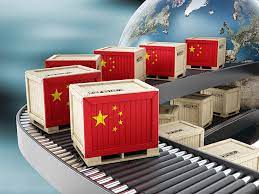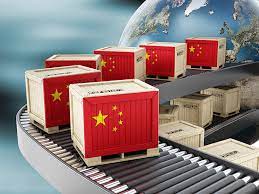
China's exporters, the world's second-largest economy's last reliable pillar as it battled the pandemic, weak consumption, and a property crisis, are warning of tough times ahead as softer overseas markets force them to lay off workers, shift to lower-value goods, and even rent out their factories.
When trade data last week showed export growth falling short of expectations and slowing for the first time in four months, alarm bells rang for China's $18 trillion economy. more info
These warnings are being heard in workshops across eastern and southern China's manufacturing hubs, in industries ranging from machinery parts and textiles to high-tech home appliances, where businesses are shrinking as export orders dry up.
"It is very likely China's exports will slow further or even contract in the coming months, as leading economic indicators point to a global growth slowdown or even recession," said Nie Wen, a Shanghai-based economist at Hwabao Trust.
With all other pillars of China's economy on shaky ground, exports are more important than ever. Even as outbound shipments slow, Nie estimates that exports will account for 30-40 per cent of China's GDP growth this year, up from 20 per cent last year.
"We had no export orders in the first eight months at all," said Yang Bingben, 35, whose company makes industrial-use valves in eastern China's export and manufacturing hub of Wenzhou.
He laid off all but 17 of his 150 employees and rented out the majority of his 7,500-square-meter (80,730-square-foot) plant.
He sees little hope for the fourth quarter, his busiest season, and expects sales to fall 50-65 per cent from last year, with the stalling domestic economy unable to pick up the slack from the export slump.
Export tax breaks have been expanded to help the sector, and a cabinet meeting chaired by Premier Li Keqiang on Tuesday pledged support for exporters and importers in order to secure orders, expand markets, and improve the efficiency of port operations and logistics.
China has taken steps in recent years to reduce its economy's reliance on exports for growth and to reduce its exposure to global factors beyond its control, while some low-cost manufacturing has shifted to other countries such as Vietnam as China's wealth has increased and its costs have risen.
According to World Bank data, the share of exports in China's GDP fell from 23.5 per cent to 18.4 per cent in the five years preceding the pandemic, from 2014 to 2019.
However, with the emergence of COVID-19, that share increased again, reaching 20 per cent last year, thanks in part to locked-down, home-bound consumers around the world snapping up China's electronics and household goods. This also aided China's overall economic growth.
However, the pandemic has returned to China this year. Its strict efforts to contain domestic COVID outbreaks resulted in supply chain and shipping disruptions.
The slowdown in overseas demand, however, has been much more concerning for exporters, they say, as the pandemic's fallout and the Ukraine conflict fuel inflation and tighter monetary policies that are depressing global growth.
"Sliding demand for robot vacuum cleaners in Europe is beyond our expectation this year, with customers placing fewer orders and unwilling to buy expensive products," said Qi Yong, a Shenzhen-based exporter of smart home electronics.
"Compared with 2020 and 2021, this year is the harder one, full of unprecedented hardship," he said. While shipments picked up this month in the run-up to Christmas, he said, sales may still drop 20 per cent in the third quarter from a year earlier.
(Source:www.reuters.com)
When trade data last week showed export growth falling short of expectations and slowing for the first time in four months, alarm bells rang for China's $18 trillion economy. more info
These warnings are being heard in workshops across eastern and southern China's manufacturing hubs, in industries ranging from machinery parts and textiles to high-tech home appliances, where businesses are shrinking as export orders dry up.
"It is very likely China's exports will slow further or even contract in the coming months, as leading economic indicators point to a global growth slowdown or even recession," said Nie Wen, a Shanghai-based economist at Hwabao Trust.
With all other pillars of China's economy on shaky ground, exports are more important than ever. Even as outbound shipments slow, Nie estimates that exports will account for 30-40 per cent of China's GDP growth this year, up from 20 per cent last year.
"We had no export orders in the first eight months at all," said Yang Bingben, 35, whose company makes industrial-use valves in eastern China's export and manufacturing hub of Wenzhou.
He laid off all but 17 of his 150 employees and rented out the majority of his 7,500-square-meter (80,730-square-foot) plant.
He sees little hope for the fourth quarter, his busiest season, and expects sales to fall 50-65 per cent from last year, with the stalling domestic economy unable to pick up the slack from the export slump.
Export tax breaks have been expanded to help the sector, and a cabinet meeting chaired by Premier Li Keqiang on Tuesday pledged support for exporters and importers in order to secure orders, expand markets, and improve the efficiency of port operations and logistics.
China has taken steps in recent years to reduce its economy's reliance on exports for growth and to reduce its exposure to global factors beyond its control, while some low-cost manufacturing has shifted to other countries such as Vietnam as China's wealth has increased and its costs have risen.
According to World Bank data, the share of exports in China's GDP fell from 23.5 per cent to 18.4 per cent in the five years preceding the pandemic, from 2014 to 2019.
However, with the emergence of COVID-19, that share increased again, reaching 20 per cent last year, thanks in part to locked-down, home-bound consumers around the world snapping up China's electronics and household goods. This also aided China's overall economic growth.
However, the pandemic has returned to China this year. Its strict efforts to contain domestic COVID outbreaks resulted in supply chain and shipping disruptions.
The slowdown in overseas demand, however, has been much more concerning for exporters, they say, as the pandemic's fallout and the Ukraine conflict fuel inflation and tighter monetary policies that are depressing global growth.
"Sliding demand for robot vacuum cleaners in Europe is beyond our expectation this year, with customers placing fewer orders and unwilling to buy expensive products," said Qi Yong, a Shenzhen-based exporter of smart home electronics.
"Compared with 2020 and 2021, this year is the harder one, full of unprecedented hardship," he said. While shipments picked up this month in the run-up to Christmas, he said, sales may still drop 20 per cent in the third quarter from a year earlier.
(Source:www.reuters.com)





